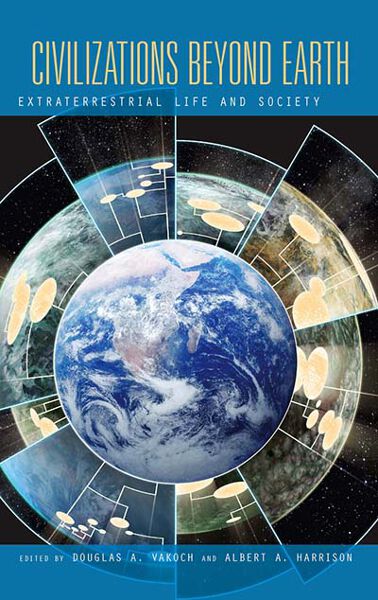In 2005, a survey of 1,000 U.S. men and women of various backgrounds revealed that 6 in 10 Americans believe in the possibility of extraterrestrial life. If this slice of the public is correct, what does it mean for our world? That is one of the questions editors Douglas A. Vakoch and Albert A. Harrison attempt to answer through the collection Civilizations Beyond Earth: Extraterrestrial Life and Society, which was released in paperback August 2013. Below, volume contributor George Pettinico begs the question of the American reaction: How will the U.S. react if we discover life outside of our blue planet?
_____________________________________________

Imagine the day, if and when it should come, that the Search for Extraterrestrial Intelligence (SETI) confirms there is indeed intelligent life on other planets.
How will the American public react? Will they rejoice in the excitement of knowing we are not alone in the universe? Or, will they react with fear and apprehension, anticipating an invasion from above, as Hollywood has so vividly shown us in numerous movies?
Will they even believe it?
In 2005 the National Geographic Channel, the SETI Institute, and the University of Connecticut partnered to conduct a national representative survey of adult Americans on the topic of life beyond Earth. This survey was one of the most comprehensive done on the topic.
Below is a short list of some of what was found:
— As of 2005, 60 percent of adult Americans believe in life on other planets. You are most likely to believe in life on other planets if you are male, less religious and middle-aged. You are least likely to believe in life on other planets if you are female, over age 60, and (especially) if you are religious, where religiosity is defined as frequency of religious service attendance.
— 45 percent of Americans who are open to the possibility of life on other planets expect we will confirm this sometime in the next few decades. The rest think it will take much longer (centuries).
— Do Americans expect life on a lot of planets swirling about in the universe, or just a few? Among those who are open to the possibility of extraterrestrial life, there is no consensus. 45 percent think life is pretty rare and is on “only a few planets.” The rest are equally divided between life on “hundreds of planets,” “thousands of planets,” and “millions of planets.” (Granted, this survey was in 2005, before astronomers barraged us with so many planetary discoveries.)
— Among those who are open to the possibility of life on other planets, would they be afraid and nervous if this were confirmed, or excited and hopeful? Interestingly, the vast majority—7 in 10—say they would be very positive if such news were to be confirmed. Only 2 in 10 would describe themselves as afraid and nervous if extraterrestrial life were confirmed. It seems Hollywood has less impact than we might think!
We spent some time in the survey trying to understand why about 4 in 10 Americans refuse to believe in life on other planets. Religious reasons are a major factor, with many telling us their religious beliefs simply will not allow it. In addition, many people told us that with all the telescopes and space probes humans have used over the decades, if we haven’t gotten any evidence yet they don’t expect to ever get any.
It certainly would be worthwhile to repeat this survey in the near future, as more and more planets are discovered, to see if public perceptions are changing. And perhaps we should hurry up and field another survey, before SETI confirms once and for all that there is indeed life beyond Earth.
_____________________________________________________
George Pettinico is Director of market research at Boehringer Ingelheim Pharmaceuticals, where he leads a department of sixteen professionals, managing about $25 million of research projects. The research he reports in this book was conducted when he was the associate director of the Center for Survey Research and Analysis at the University of Connecticut.
Civilizations Beyond Earth was first published in September 2011. The collection was edited by Douglas A. Vakoch and Albert Harrison.
Douglas A. Vakoch is Professor in the Department of Clinical Psychology at the California Institute of Integral Studies, as well as Director of Interstellar Message Composition at the SETI Institute. He serves as Chair of both the International Academy of Astronautics (IAA) Study Group on Interstellar Message Construction and the IAA Study Group on Active SETI: Scientific, Technical, Societal, and Legal Dimensions. His books include Communication with Extraterrestrial Intelligence (CETI), Psychology of Space Exploration: Contemporary Research in Historical Perspective, and Ecofeminism and Rhetoric: Critical Perspectives on Sex, Technology, and Discourse.
Albert A. Harrison is Professor Emeritus in the Department of Psychology at the University of California, Davis. In addition to researching the societal dimensions of astrobiology and SETI, he studies human adaptation to spaceflight and spaceflight-analogous environments. His books include After Contact: The Human Response to Extraterrestrial Life; Starstruck: Cosmic Visions in Science, Religion, and Folklore; Spacefaring: The Human Dimension; Living Aloft: Human Requirements for Extended Spaceflight; and From Antarctica to Outer Space: Life in Isolation and Confinement.
Related Link:
Download Douglas Vakoch’s talk “How Do We Explain Aesthetics to Extraterrestrial Civilizations” from The Main Public Broadcasting Network.
